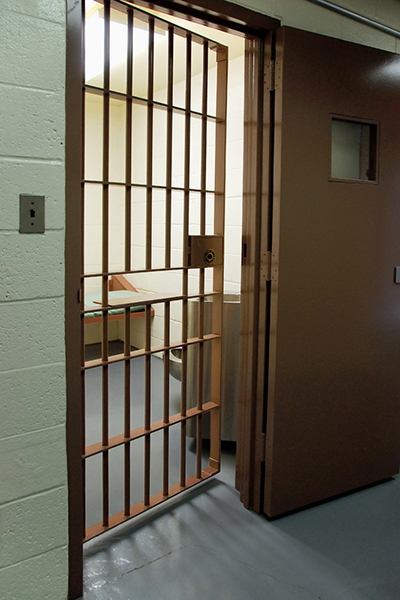“Mass incarceration makes our country worse off, and we need to do something about it.” President Barack Obama made this announcement in mid-July, during his historic visit to El Reno Federal Correctional Institution in Oklahoma.
The president’s visit was part of his push for criminal legal reform, as he has heralded the necessity of shorter sentences for nonviolent drug offenders and less crowding in the country’s correctional facilities.
But during that visit, Obama was not confronted with the most draconian prison conditions our country has to offer. El Reno is not the worst of the worst when it comes to overcrowding, restrictive activities and in particular solitary confinement in the federal system. That dubious honor is reserved for other prisons – including, very likely, the soon-to-open Administrative Maximum US Penitentiary (ADX/USP) Thomson, 150 miles west of Obama’s adopted hometown of Chicago.
In 2012, the federal government purchased the disused Thomson Correctional Center in western Illinois for $165 million. Initially, the Obama administration considered the prison to be a prime contender for housing detainees transferred from Guantánamo to the mainland United States. But after congressional legislation barred such transfers, Thomson’s mission changed to housing high-security federal prisoners.
The controversial prison will be up and running as soon as this year. A 2016 performance budget from the US Justice Department announced that ADX/USP Thomson was to begin the “activation process” in fiscal years 2015 and 2016.
The Federal Bureau of Prisons committed almost $54 million to the facility in 2014 in order to renovate the prison and pay for staffing and equipment. A warden for the facility was announced in August 2014 and the prison will begin receiving 80 minimum-security prisoners in July.
But Thomson will be no ordinary prison. Solitary Watch reported that the Federal Bureau of Prisons intends to add 1,500 “special management units” and 400 additional “administrative maximum-rated cells” to the old state prison – essentially doubling the number of prisoners who will be held in total isolation in the federal system.
The plans for Thomson are not unique. A model is ADX Florence in Colorado, the highest-security prison in the country, where prisoners spend 23 hours per day confined alone in 12-foot-by-7-foot cells. That prison – which has been subject to international condemnation – is at the center of an ongoing lawsuit (the largest in history against the Bureau of Prisons) as a result of the severe deprivations at the facility and its unconstitutional treatment of prisoners living with mentally illness.
What is unique about Thomson are the facility’s political champions – most notably Sen. Dick Durbin (D-Illinois), an outspoken critic of solitary confinement, who chaired the first congressional hearing about the practice in 2012. As Durbin acknowledged in a statement from his office, solitary confinement has severe psychological effects on human beings, leading to “mental illness, self-mutilation and suicide.”
Leading solitary researcher Dr. Craig Haney concurs. He has called the practice a “torture device” that fails to serve any penological purpose.
Yet despite such evidence – and his own vocal stance against solitary – Durbin has publicly and enthusiastically supported Thomson’s opening. He has effected an alliance with US Rep. Cheri Bustos (D-Illinois) (who is from the Illinois district where Thomson is located) to tout the creation of the 1,100 jobs that may come with the prison’s opening.
Just this spring, Durbin and Bustos met with Charles Samuels, director of the Bureau of Prisons, and afterward they announced that the agency would commit an additional $60 million this year toward the prison’s activation.
Illinois has long confronted tensions between the rights of prisoners and the political pull of new jobs offered by prisons. The American Federation of State, County and Municipal Employees, the union representing the state’s prison employees, vociferously fought the closing of Tamms Correctional Center, Illinois’ own supermax prison.
Tamms did eventually close in 2013, by dictate of then-Gov. Pat Quinn and partly as a result of advocates’ efforts to cease its operations. But now these same tensions are again coming to a head. Advocates have scheduled a protest on July 23 of the feds’ plans to open Thomson, as part of nationally coordinated effort to end solitary confinement. These protesters are promoting an instrumental human rights objective: Ensuring people’s livelihoods are important but not at the expense of the mental and physical well-being of other human beings.
On his prison tour, Obama specifically thanked Durbin for the work he was doing to reduce mandatory minimums and other overly harsh punitive policies. The senator – and his supporters – can make real headway in promoting criminal legal reform by refusing to allow political pandering to trump prisoners’ rights. The torturous practice of solitary confinement must end, in Illinois and nationwide.
Join us in defending the truth before it’s too late
The future of independent journalism is uncertain, and the consequences of losing it are too grave to ignore. To ensure Truthout remains safe, strong, and free, we need to raise $22,000 by the end of today. Every dollar raised goes directly toward the costs of producing news you can trust.
Please give what you can — because by supporting us with a tax-deductible donation, you’re not just preserving a source of news, you’re helping to safeguard what’s left of our democracy.
